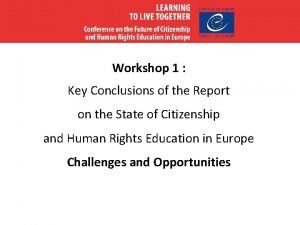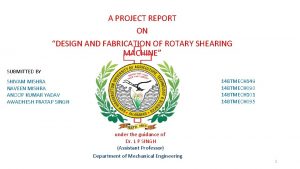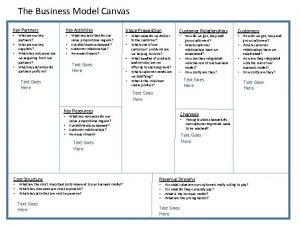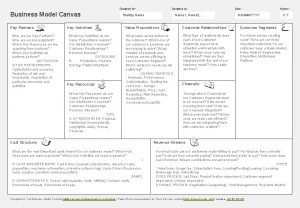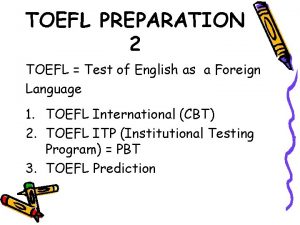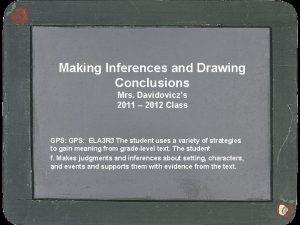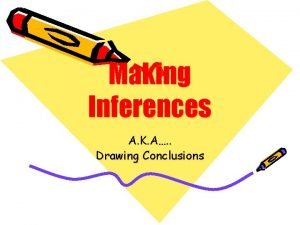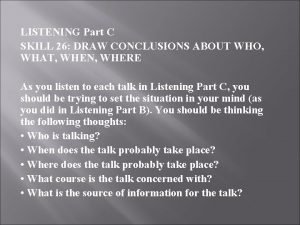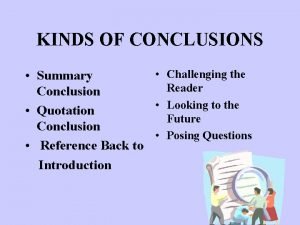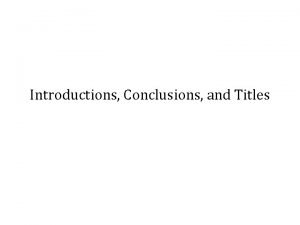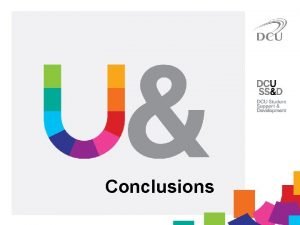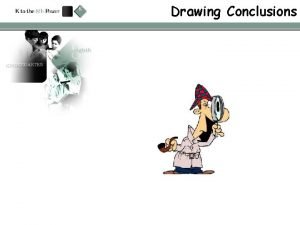Workshop 1 Key Conclusions of the Report on









- Slides: 9

Workshop 1 : Key Conclusions of the Report on the State of Citizenship and Human Rights Education in Europe Challenges and Opportunities

Pre-School Education 1. Child-centered approach 2. Bridging homes, schools/early chilhood institutions, community and government 3. Recognising Early Childhood as an important arena and stage for active and global citizenship 4. Foster and nurture democratic and human rights culture through an enabling environment and modelling 5. Training of parents, educators and other professionals

Primary and Lower Secondary Education 1. Whole school approach; 2. Building EDC/HRE friendly curricula; 3. Support to teachers and Teacher training in EDC/HRE 4. Primary and Lower Secondary education: not a priority? 5. Relaunching EDC/HRE for 21 st century and renewing our commitment.

Upper Secondary Education 1. There is a need for adequate teacher training in EDC/HRE: initial teacher training and professionalization. 2. Attention to evaluation and assessment. There is a need for a bigger focus on formative assessment and evaluation that stimulates empowerment, including reflection and meta-cognition. 3. Whole School Approach: involvement of teachers and pupils in school policy and decision making processes. 4. Provide a shared platform for developing a common understanding and finding opportunities for co-operation. 5. The Council of Europe should try to obtain more visibility, create more awareness and create modules that stimulate reflection.

Higher Education 1. The university autonomy is not absolute; it should protect academic freedom as a specific realization of principles of democratic citizenship, particularly important for students as new citizens. 2. The civic mission obliges universities to prepare young people for active and creative citizenship, and is also connected with security aspect of today’s societies. 3. Cross combinations of course contents and/or targeted groups of students are particularly important for professional training related to EDC/CRE. 4. The research mission and international cooperation qualify universities for active role in creation of EDC/HRE policies. 5. Council of Europe should have a leading role in the future development of quality assessment and accreditation procedures related to EDC/HRE training.

Non-formal Education and Youth Work 1. Youth organisations should receive continuous and sufficient financial support 2. EDC/HRE providers in non-formal education should be encouraged and supported to establish and coordinate networks. 3. Civil society should be meaningfully involved in the process of monitoring and evaluating implementation of EDC/HRE 4. To improve positive discourse and general public awareness about the EDC/HRE, public campaigns on national and European levels should be developed. 5. Sufficient support mechanisms, including but not limited to training and resources on EDC/HRE, should be put in place.

Vocational Education and Training and Adult Education 1. There a wide diversity of different vocational systems across Europe. 2. In some countries VET route is over represented by most socio-economically disadvantaged including non citizens and refugees. 3. Co. E lead and initiate activities on EDC/HRE in VET 4. Implement a systematic and long term approach in the implementation of EDC/HRE into VET 5. Increase in research funding, independent evaluation and systematic monitoring framework on EDC/HRE VET 6. Purpose of education needs to be revisited – in the legislation it is important to identify the humanistic purpose of education including for IVET students

Lifelong Learning 1. Increase the responsibility of teachers to raise awareness and promote democratic citizenship and human rights values. 2. Give democratic citizenship and human rights education a prominent role in the curricula. 3. Develop practical and useful evaluation criteria and tools for assessing the outcome of educational practice and citizens’ behaviour resulting from it. 4. Create proper conditions for NGOs to deliver education on democratic citizenship and human rights in pre-school education, vocational and higher education. 5. Make a formal obligation to schools and universities to provide their students with organised debates and discussions on citizenship and human rights related issues

Lifelong Learning 1. Inconsistencies could not be so negative elements inside of Democracy itself. 2. Make a clear picture - how understandable is the space between Charter and its implementation. 3. Develop the mixed methods and instruments for Evaluation. 4. State strategy should contain various strategies according to the 1) age groups, 2) life experience, 3) professional experience. 5. Participatory approach should be recognised as a key element in the LLL Educational policies.
 Conclusion for workshop report
Conclusion for workshop report Project report on fabrication workshop
Project report on fabrication workshop Key business activities
Key business activities Business model canvas tripadvisor
Business model canvas tripadvisor Skill 19 anticipate the questions
Skill 19 anticipate the questions Drawing conclusions and making inferences powerpoint
Drawing conclusions and making inferences powerpoint Example of drawing inferences
Example of drawing inferences Listening skills conclusion
Listening skills conclusion Difference between summary and conclusion
Difference between summary and conclusion Titles for introductions
Titles for introductions
